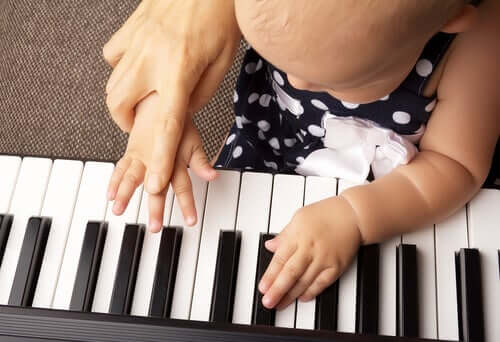The Benefits of Playing the Piano in Childhood

The benefits of playing the piano in childhood are those that allow a whole process of mental, psychological, physiological, and comprehensive improvement to begin. This is particularly due to the fact that childhood is the most vulnerable stage and, in turn, the key phase of human development.
There are many activities that parents can select for their children, in which, without a doubt, they would obtain great and important changes.
Each change can be perceived in both the short and long term. In other words, the benefits that children experience today will last over time.
In view of this, it’s important to emphasize that music plays an important role in this period of human life. Music is one of those many activities that promote the integral well-being of people at any age.
Therefore, playing the piano in childhood can bring a series of physical and intellectual benefits that we’ll talk about below.
The physical benefits of playing the piano in childhood
Many people consider that playing this instrument is only pure entertainment or has a purely recreational character. However, the benefits go beyond that. Among the many advantages that piano practice brings to children, we can list the following:
- It reduces the risk of suffering from arthritis because the fingers of children who practice it will be in constant movement in order to be able to correctly interpret a melody.
- It improves the coordination capacity between each part of the body, as this activity requires the coherent movement of both hands, the optimal use of the eyes, and in turn, the correct use of the auditory sense to be able to compose or interpret a melody.

- Improves physical condition, playing this instrument burns approximately 140 to 150 calories per hour, which is why it’s considered a moderate anaerobic exercise that contributes to the physical improvement of those who practice it daily.
Intellectual benefits
The piano is an instrument that demands effort on the part of the person who plays it, it requires high concentration, a marked commitment, and the correct disposition to achieve effective learning and continuous improvement of the necessary techniques.

Therefore, the child is nourished with the following advantages:
- Memory development, due to the great capacity that the infant must have to be able to learn a score and the techniques necessary to interpret it.
- Increases the sense of responsibility, when playing the piano, the child acquires a certain discipline, since they fundamentally seek continuous improvement, reaching priorities in their daily life.
- Concentration improves, the commitment acquired by the child leads them to focus their full attention in order to achieve the required results in the requested time. Like, for example, playing a melody.
- Their intellectual capacity increases, the child learns to know and enter the artistic world, changing their perspective on life, making them more sensitive and with a greater cognitive capacity.
- It prevents mental illnesses, thanks to the fact that it constantly exercises the brain.
- It promotes teamwork, for a melody to sound good, the effort of the whole group is required, in the case that the child belongs to an orchestra.
- It teaches them how to overcome fears, take risks, and improve self-esteem when interpreting the melodies in front of a possible audience, which implies striving to achieve their satisfaction. In addition, through music, you can get to express your feelings to other people.
Playing the piano is an excellent option for the integral development of a child. For this reason, many specialists recommend its practice in the initial stage of life.
A child’s body is more receptive both to learning and to accepting and developing everything that can add value during practice.
It’s important to note that those who learn to play an instrument at an early age can experience the benefits described above for the rest of their lives. Therefore, a better physical and psychological performance is obtained as they mature in age.
In short, what’s sought with this is to see happier children. Furthermore, children are made sure of themselves; devoid of fears, more relaxed with their environment, and with a higher intellectual level. This translates into an excellent quality of life.
The benefits of playing the piano in childhood are those that allow a whole process of mental, psychological, physiological, and comprehensive improvement to begin. This is particularly due to the fact that childhood is the most vulnerable stage and, in turn, the key phase of human development.
There are many activities that parents can select for their children, in which, without a doubt, they would obtain great and important changes.
Each change can be perceived in both the short and long term. In other words, the benefits that children experience today will last over time.
In view of this, it’s important to emphasize that music plays an important role in this period of human life. Music is one of those many activities that promote the integral well-being of people at any age.
Therefore, playing the piano in childhood can bring a series of physical and intellectual benefits that we’ll talk about below.
The physical benefits of playing the piano in childhood
Many people consider that playing this instrument is only pure entertainment or has a purely recreational character. However, the benefits go beyond that. Among the many advantages that piano practice brings to children, we can list the following:
- It reduces the risk of suffering from arthritis because the fingers of children who practice it will be in constant movement in order to be able to correctly interpret a melody.
- It improves the coordination capacity between each part of the body, as this activity requires the coherent movement of both hands, the optimal use of the eyes, and in turn, the correct use of the auditory sense to be able to compose or interpret a melody.

- Improves physical condition, playing this instrument burns approximately 140 to 150 calories per hour, which is why it’s considered a moderate anaerobic exercise that contributes to the physical improvement of those who practice it daily.
Intellectual benefits
The piano is an instrument that demands effort on the part of the person who plays it, it requires high concentration, a marked commitment, and the correct disposition to achieve effective learning and continuous improvement of the necessary techniques.

Therefore, the child is nourished with the following advantages:
- Memory development, due to the great capacity that the infant must have to be able to learn a score and the techniques necessary to interpret it.
- Increases the sense of responsibility, when playing the piano, the child acquires a certain discipline, since they fundamentally seek continuous improvement, reaching priorities in their daily life.
- Concentration improves, the commitment acquired by the child leads them to focus their full attention in order to achieve the required results in the requested time. Like, for example, playing a melody.
- Their intellectual capacity increases, the child learns to know and enter the artistic world, changing their perspective on life, making them more sensitive and with a greater cognitive capacity.
- It prevents mental illnesses, thanks to the fact that it constantly exercises the brain.
- It promotes teamwork, for a melody to sound good, the effort of the whole group is required, in the case that the child belongs to an orchestra.
- It teaches them how to overcome fears, take risks, and improve self-esteem when interpreting the melodies in front of a possible audience, which implies striving to achieve their satisfaction. In addition, through music, you can get to express your feelings to other people.
Playing the piano is an excellent option for the integral development of a child. For this reason, many specialists recommend its practice in the initial stage of life.
A child’s body is more receptive both to learning and to accepting and developing everything that can add value during practice.
It’s important to note that those who learn to play an instrument at an early age can experience the benefits described above for the rest of their lives. Therefore, a better physical and psychological performance is obtained as they mature in age.
In short, what’s sought with this is to see happier children. Furthermore, children are made sure of themselves; devoid of fears, more relaxed with their environment, and with a higher intellectual level. This translates into an excellent quality of life.
All cited sources were thoroughly reviewed by our team to ensure their quality, reliability, currency, and validity. The bibliography of this article was considered reliable and of academic or scientific accuracy.
- Benítez, M. A., Abrahan, V. M. D., & Justel, N. R. (2018). Beneficios del entrenamiento musical en el desarrollo infantil: una revisión sistemática. Revista internacional de educación musical, (5), 61-69. http://www.revistaeducacionmusical.org/index.php/rem1/article/view/100
- Albornoz, Y. (2009). Emoción, música y aprendizaje significativo. Educere, 13(44). https://www.redalyc.org:9444/error.xhtml?cid=306728
- Brewer, C. (1995). Music and learning: Integrating music in the classroom. Bellingham, WA: LifeSounds.
- Mantilla, D. (2012). La influencia de la musica en el aprendizaje infantil. 1 de Noviembre.
- Tobar, C. (2013). Beneficios de la música en el aprendizaje. Revista EducAcción, 18, 34-35. http://www.usfq.edu.ec/publicaciones/para_el_aula/Documents/para_el_aula_06/0018_para_el_aula_06.pdf
- Vargas, R., & María, K. (2010). La educación musical y su impacto en el desarrollo. Revista de educación y desarrollo, 53-60. http://www.cucs.udg.mx/revistas/edu_desarrollo/anteriores/12/012_Reynoso.pdf
This text is provided for informational purposes only and does not replace consultation with a professional. If in doubt, consult your specialist.








